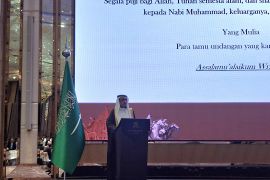On one hand, during the pandemic, we have experienced a decline in services. However, thank God, the data shows that the figure related to the Total Fertility Rate has decreasedJakarta (ANTARA) - A decline in the national Total Fertility Rate has suppressed the baby boom during the COVID-19 pandemic, according to the National Population and Family Planning Agency.
"On one hand, during the pandemic, we have experienced a decline in services. However, thank God, the data shows that the figure related to the Total Fertility Rate has decreased," Head of the National Population and Family Planning Agency Hasto Wardoyo noted in a written statement received here on Friday.
According to the 2021 Family Data Collection report, Indonesia's total birth rate fell to 2.24. In 2017, the number was still capped at 2.4.
Despite the good news, Wardoyo reminded his staff and midwives to remain alert on account of the state's high maternal mortality rate. This issue should be highlighted due to the fact that almost 80 percent of mothers opt to give birth through a midwife.
Related news: President lauds ACF-A's role in developing COVID-19 vaccines
“There was a surprising increase in 2007 to 228 (deaths) per 100 thousand births. We were even more shocked (that) in 2012, (the rate had increased) to 359. Hence, the role of midwives is very important in order to reduce it," he stated.
The use of postnatal contraception should be encouraged among members of the public since it was also at a rather low realization. This is especially the case with the number of couples of childbearing age looking to delay pregnancy yet reluctant to join the family planning program.
Wardoyo advised couples of the childbearing age to combine the Lactational Amenorrhea Method (MAL) and postnatal condom use while also encouraging midwives to provide counseling for the EFA.
Wardoyo stated that the measures were important in order to keep a pregnancy gap to prevent maternal death.
Related news: Merah Putih Vaccine included in super-priority program by Jokowi
Clinical psychologist and sex educator, Inez Kristanti, stated that couples, who had discussions about contraception, could promote equality or equity in the relationship.
Kristianti noted that the psychological effects proffered by dialogues surrounding contraception selection between couples could reflect positively on household harmony apart from it being an effort to support family planning.
“This can initiate or increase the assertiveness of condom use. That includes sexual assertiveness in psychological terms. Hence, (both) the women and men have equal contribution. (They) can work together as a team to determine the right contraception (for them),” she concluded.
Related news: Hope to start indigenous vaccine production in Aug: Biotis, Unair
Related news: Aim to produce 240 mln Merah Putih doses per year: Biotis
Translator: Hreeloita D S, Mecca Yumna
Editor: Fardah Assegaf
Copyright © ANTARA 2022












